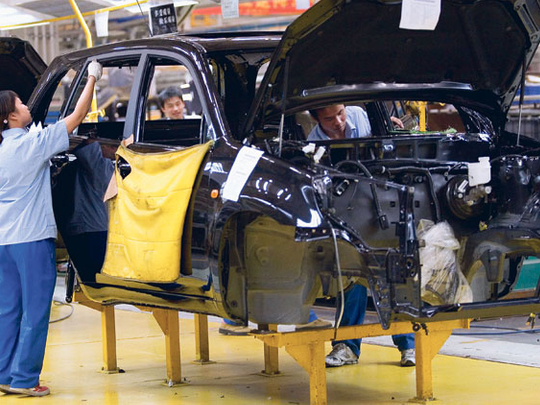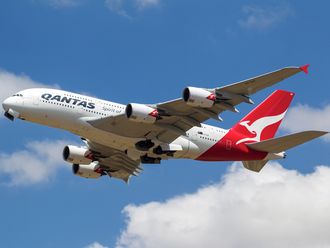
Beijing: China's economic growth accelerated to the fastest pace in almost three years in the first quarter, highlighting overheating risks that may prompt the government to scrap the yuan's peg to the dollar.
Gross domestic product rose 11.9 per cent from a year earlier, the statistics bureau said at a briefing in Beijing yesterday. That was more than the median 11.7 per cent estimate in a Bloomberg News survey of 24 economists.
A lower-than-estimated gain in consumer prices complicates a debate in Beijing on when to raise interest rates, cut in 2008 to counter the financial crisis. Australia and India have already moved and Singapore on Wednesday allowed a one-time revaluation of its currency as the region winds back stimulus policies to limit asset-bubble and inflation risks.
"The next policy move remains likely to be a yuan revaluation," said Glenn Maguire, chief Asia-Pacific economist at Societe Generale in Hong Kong. Inflation data may lead the central bank to delay an interest-rate increase until the second half of the year, he said.
Stock market
The Shanghai Composite Index swung between losses and gains, falling 0.1 per cent as of the 11.30am local-time trading break. Non-deliverable yuan forwards climbed 0.1 per cent to 6.6161 per dollar, suggesting the currency may strengthen 3.2 per cent in the next 12 months.
Consumer prices rose 2.4 per cent in March from a year earlier, yesterday's data showed, compared with 2.7 per cent in February. Economists' median estimate was 2.6 per cent.
Industrial production climbed 18.1 per cent in March, less than a 20.7 per cent gain in the first two months, and retail sales increased 18 per cent, data showed. Car sales leapt 76 per cent in the first quarter from a year earlier, with Mercedes-Benz (China) reporting a doubling.
"The case for policy tightening remains intact given the risks of China's economy overheating," said Brian Jackson, a Hong Kong-based emerging-market strategist at Royal Bank of Canada. "The fall in inflation in March may persuade policy makers to stay on hold a little longer."
The last time China's growth accelerated to more than 11 per cent, in the first quarter of 2006, the central bank raised interest rates within a month to curb lending and investment. The inflation rate was only 0.8 per cent.
China's cabinet on Wednesday signalled caution in ending crisis policies even after exports jumped 29 per cent in the first quarter. Economic growth was largely driven by stimulus policies and a comparison with low levels in 2009, the State Council said. Policy makers pledged to do more to rein in the housing market after property prices rose by a record in March.
Urban fixed-asset investment increased 26.4 per cent in the first quarter from a year earlier, the statistics bureau said yesterday. Producer prices rose 5.9 per cent in March, after climbing 5.4 per cent in February.
US Treasury Secretary Timothy F. Geithner's unscheduled meeting with Chinese Vice-Premier Wang Qishan in Beijing on April 8 fuelled speculation that the yuan's 21-month-old peg at about 6.83 per dollar may be scrapped amid calls in Congress to brand China a currency manipulator.
Refinery: Capacity increases
China processed 18 per cent more crude oil in March as the country's refining capacity increased and the economic recovery spurred consumption of fuels.
The nation refined 34.56 million metric tonnes, or 8.17 million barrels a day, of crude oil last month compared with a year earlier, according to China Mainland Marketing Research, which compiles data for the government. That is the highest level after volume reached 34.6 million tonnes in December.
Industrial production expanded 18 per cent in March as China's economy grew at the fastest pace in almost three years in the first quarter, boosting factory demand for fuels. The gain in energy consumption may not be enough to absorb the 31.5 million tonnes a year of refining capacity that is expected to be added this year, China National Petroleum said in February.
"Refining volumes will keep increasing because more and more capacity are coming online," Shi Yan, an oil analyst at UOB-Kay Hian, said by telephone from Shanghai. "At this rate, crude imports and product exports will keep rising."
China bought 21 million tonnes of crude oil last month, driving net imports to the second-highest level after a December record. It's not economical to have refineries and not utilise them just because domestic demand cannot keep pace, Shi said.












